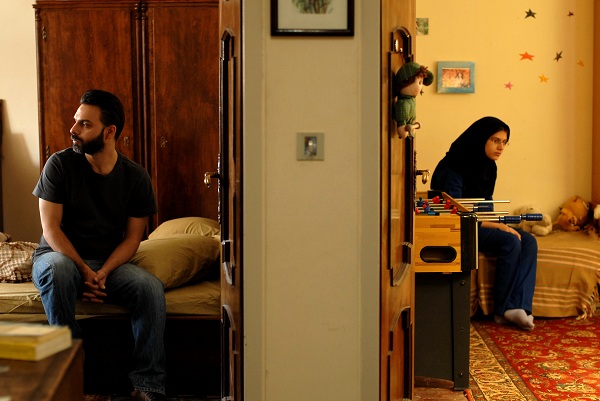Read my interview with Director Asghar Farhadi here!
Limacher Low Down: A Separation recently won the 2012 Golden Globe for Best Foreign Language Film, and it is easy to understand why. The film is a character study of several people living in Iran and the circumstances they find themselves in drives the movie. The acting is outstanding, and while a few things may be lost on viewers that don’t understand the culture, the story can easily be considered universal.
The movie begins in a courtroom, and we see two people through the eyes of the judge. Immediately we learn that a couple has filed for divorce, and the only thing holding up the proceedings is the issue of custody of their young daughter. Nader (Peyman Moadi) is the father who wants to stay in Iran with his daughter to take care of his elderly father who is stricken with dementia. Simin (Leila Hatami) is the mother who wants to flee from Iran and move somewhere to be with her family without possible prosecution. Simin wants to leave right away before her passport expires, and does not want to leave without her husband and daughter. This is really an interesting set of circumstances. When most of us think of divorce, it is because of issues that cannot be resolved. This couple still loves each other, but because of insinuating circumstances, they need to divorce.
There is a moving scene in Nader and Simin’s apartment where they discuss the court proceedings with their daughter Termeh (Sarina Farhadi). Nader is a loving father, and it seems while Termeh speaks with Simin, she wants to stay with her Father. Simin understands that she needs to leave and leaves the number of a person to take care of Nader’s ailing father since she will no longer be around to take care of him. Enter Razieh (Sareh Bayat) who becomes the caretaker of Nader’s father.
Razieh has strict religious beliefs which don’t allow her to take care of some of the duties that she needs to perform to take care of Nader’s father. After thinking long and hard about whether or not to return the next day, she does. This is interesting because it gives some insight into the religious beliefs of some in Iran, and where the line is truly drawn. It also shows that people can/will do whatever they can to support their family in times of need and that theme builds the crescendo of the film.
Razieh returns the following day to take care of Nader’s father, but leaves to take care of some personal business. Instead of taking care of Nader’s father, she decides to get creative with his care. Nader returns home to find his father nearly dead lying on the floor. Razieh and Nader exchange some words that leads into another story that starts to develop into multiple story-lines which all come together. Putting the angst into the heart of the audience, the film made me question my own emotions and left me curious where the story would go next.
Nader receives a call that Razieh is in the hospital and that Simin is still with her family in the city. Nader and Simin rush to the hospital to find out what happened to Razieh and to find out if there is anything they can do to help. They come across Razieh’s husband, Hodjat (Shahab Hosseini), who at first is very calm and thankful that Nader and Simin have come to the hospital to check on his wife. While Nader is first greeted with grace by Razieh’s husband, things change rapidly and Nader finds himself the target of a lawsuit. This is the point in the movie where I lost all control of how to react. I started to question the people and how I might react in a similar situation. This scene really opens up the characters to scrutiny, and when you think you have answers . . . all the questions develop more questions.
Facts come to light, but not all the answers are given and it remains up to the viewer to draw their own conclusion. The movie flows continuously and is unrelenting as a way of making the viewer not only question the actions of the actors, but also question how they would react in a similar situation. Right when you think everything is tied up the ending comes and leaves the biggest question of all. Read my interview with Director Asghar Farhadi to get more of an understanding about the climax.
The film grants the audience the proverbial fly on the wall perspective to the drama that unfolds over the course of the story. While it may not be for everyone, people who enjoy drama and excellent story-telling will be more than inclined to go out of their way to see “A Separation”. The thing that makes this film so compelling is the way the story sticks with you. These are not characters who are easily forgotten, and it is films like this that make movie going a genuine experience.




